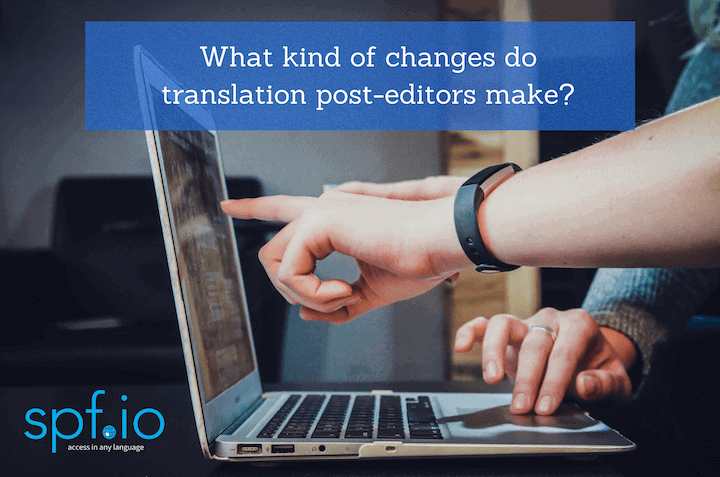What is the difference between translation and post-editing?
In this article, we share a few examples from an English to Portuguese translation task, illustrating the kind of changes a human reviewer (also known as post-editor) might make to an automatic translation. You can see why human judgment is needed to resolve ambiguities, select appropriate words, clarify authorial intent and more.
| Explanation | English (Source) | Portuguese (Translation) |
|---|---|---|
| Word Sense Ambiguity / Idioms | ||
| In this example, the English author uses multiple unique prepositions to illustrate their point. “in” and “on” are particularly difficult to translate because in Portuguese, both go to “na”. In this case the reviewer might choose to drop the repetition, or substitute another preposition like “para”. | Within the created universe, God is present in relationship with his creatures and especially with people. Laboring in God’s image, we work in creation, on creation, with creation, and—if we work as God intends—for creation. | Trabalhando à imagem de Deus, trabalhamos na criação, |
| Two senses of the word “work” are disambiguated in Portuguese. There is “work” in the sense of employment, denoted by “trabalho” and “work” in the sense of making, denoted by “obra”. One automatic translation engine consistently chose “trabalho” even when applied to God’s work, which resulted in a strange translation. A different engine correctly chose the employment sense when it came to a “theology of work”, but the sense of making when it came to God creating. | Genesis is incomparably significant for the theology of work because it tells the story of God’s work of creation, the first work of all and the prototype for all work that follows. | Gênesis é incomparavelmente significativo para a teologia do trabalho porque conta a história da obra de criação de Deus, a primeira de todas as obras e o protótipo de todas as obras que se seguem. |
| The idiom “first-rate” was automatically translated to “first-class”, which due to its association with air travel did not make sense to the Portuguese reviewer. They chose to replace it with having “major significance to God”. | Do we regard the material world, the stuff we work with, as God’s first-rate stuff, imbued with lasting value? | Consideramos o mundo material, as coisas com as quais trabalhamos, como coisas de |
| Style / Word Choice | ||
| The post-editor considered an alternative translation: “O livro de Gênesis é a base para a teologia do trabalho.” which would accommodate a more modern style, substituting “fundamento” with “base”. Depending on the genre of the work and the intended readers, machine translation can surface alternative translations, but human judgment is required to decide on what to do. | The book of Genesis is the foundation for the theology of work. | O livro de Gênesis é |
| We compared different automatic translation engines. One automatic translation engine chose “respiração”, which is more of a medical term for breath. “sopro” is used in biblical language more frequently and was correctly selected by the other engine. | The ruah of God in Genesis 1:2 is simultaneously “breath,” “wind,” and “spirit” (see footnote b in the NRSV or compare NRSV, NASB, NIV, and KJV). | A ruah de Deus em Gênesis 1:2 é simultaneamente “sopro”, “vento” e “espírito” (veja a nota de rodapé b na NRSV ou compare NRSV, NASB, NIV e KJV). |
| Punctuation, Spacing, Capitalization, Clarification | ||
| The reviewer initially thought “human work-space” was a single concept because of different conventions around using the dash character in English versus Portuguese. They decided to use the semicolon punctuation instead to clearly indicate a connected thought. | The created universe that God brings into existence then provides the material of human work—space, time, matter and energy. | O universo criado que Deus traz à existência fornece então o material do trabalho humano |
| The post-editor considered the automatic translation to be quite precise even to the point of keeping the English phrase “kith and kin” correctly in English. Some formatting changes could be applied to the spacing around the bible citation in the beginning. | “The heavens and the earth” (Gen. 1:1; 2:1) are not two separate realms, but a Hebrew figure of speech meaning “the universe”[1] in the same way that the English phrase “kith and kin” means “relatives.” | “Os céus e a terra” ( Gn 1:1 ; 2:1 ) não são dois reinos separados, mas uma figura de linguagem hebraica que significa “o universo”[1] da mesma forma que a frase inglesa “kith and kin” significa “parentes”. |
| Due to the different ways the dash character is used in Portuguese and English, the post-editor chose to replace “começa – na terra” with “começa: na terra” | Most significantly, the Bible ends where it begins—on earth. | Mais significativamente, a Bíblia termina onde começa |
| The reviewer looked up a Portuguese Bible translation to check if “heaven” or “céu” should be capitalized and determined that it did not need to be. | Your will be done, on earth as it is in heaven” | Seja feita a tua vontade, assim na terra como no céu” |
(Note: These sample source sentences are from the Theology of Work project, used here in a limited form for educational fair use purposes. We’d also like to thank Filipe Vilela for providing an analysis of the automatic translation.)
Spf.io’s translation portal can help organizations make more and more of their content accessible in many languages by accelerating translation work for text, audio, video and live events.

